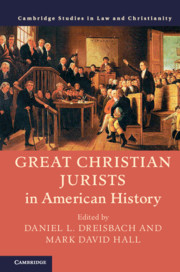Book contents
- Great Christian Jurists in American History
- Law and Christianity
- Great Christian Jurists in American History
- Copyright page
- Dedication
- Contents
- Contributors
- Preface
- Introduction: Christianity and American Law
- 1 John Cotton and Roger Williams
- 2 John Winthrop and the Covenantal Ideal
- 3 Friendly Laws: William Penn’s Christian Jurisprudence
- 4 The Friendly Jurisprudence and Early Feminism of John Dickinson
- 5 Roger Sherman, Oliver Ellsworth, and the Formation of America’s Constitutional Order
- 6 John Jay: The First Chief Justice
- 7 James Wilson
- 8 Was Justice Joseph Story a Christian Constitutionalist?
- 9 Harvard’s Evangelist of Evidence: Simon Greenleaf’s Christian Common Sense
- 10 John Marshall Harlan the Elder
- 11 Judicial Conservatism and Protestant Faith: The Case of Justice David J. Brewer
- 12 John T. Noonan, Jr.: Catholic Jurist and Judge
- 13 The Integrative Christian Jurisprudence of Harold J. Berman
- 14 Antonin Scalia: Devout Christian; Worldly Judge?
- 15 The Insights and Transitions of Mary Ann Glendon
- 16 A Reformed Liberalism: Michael McConnell’s Contributions to Christian Jurisprudence
- 17 The Jurisprudence of Robert P. George
- Index
17 - The Jurisprudence of Robert P. George
Published online by Cambridge University Press: 24 June 2019
- Great Christian Jurists in American History
- Law and Christianity
- Great Christian Jurists in American History
- Copyright page
- Dedication
- Contents
- Contributors
- Preface
- Introduction: Christianity and American Law
- 1 John Cotton and Roger Williams
- 2 John Winthrop and the Covenantal Ideal
- 3 Friendly Laws: William Penn’s Christian Jurisprudence
- 4 The Friendly Jurisprudence and Early Feminism of John Dickinson
- 5 Roger Sherman, Oliver Ellsworth, and the Formation of America’s Constitutional Order
- 6 John Jay: The First Chief Justice
- 7 James Wilson
- 8 Was Justice Joseph Story a Christian Constitutionalist?
- 9 Harvard’s Evangelist of Evidence: Simon Greenleaf’s Christian Common Sense
- 10 John Marshall Harlan the Elder
- 11 Judicial Conservatism and Protestant Faith: The Case of Justice David J. Brewer
- 12 John T. Noonan, Jr.: Catholic Jurist and Judge
- 13 The Integrative Christian Jurisprudence of Harold J. Berman
- 14 Antonin Scalia: Devout Christian; Worldly Judge?
- 15 The Insights and Transitions of Mary Ann Glendon
- 16 A Reformed Liberalism: Michael McConnell’s Contributions to Christian Jurisprudence
- 17 The Jurisprudence of Robert P. George
- Index
Summary
The jurisprudence of Robert P. George is twofold, in that he is one of the most important public law, and especially constitutional law, scholars of the late twentieth and so far in the twenty-first centuries, and, at the same time, he is America’s leading legal exponent of natural law. He is a devout Roman Catholic. But the relationship between his religious convictions and his jurisprudence will strike some readers as paradoxical. George writes: “I want to show that Christians and other believers are right to defend their positions on key moral issues as rationally superior to the alternatives proposed by secular liberals and those within the religious denominations who have abandoned traditional moral principles in favor of secularist morality.” “My criticism of secular liberal views is not that they are contrary to faith; it is that they fail the test of reason.” This chapter explains how the “paradox” is merely apparent.
- Type
- Chapter
- Information
- Great Christian Jurists in American History , pp. 300 - 318Publisher: Cambridge University PressPrint publication year: 2019

